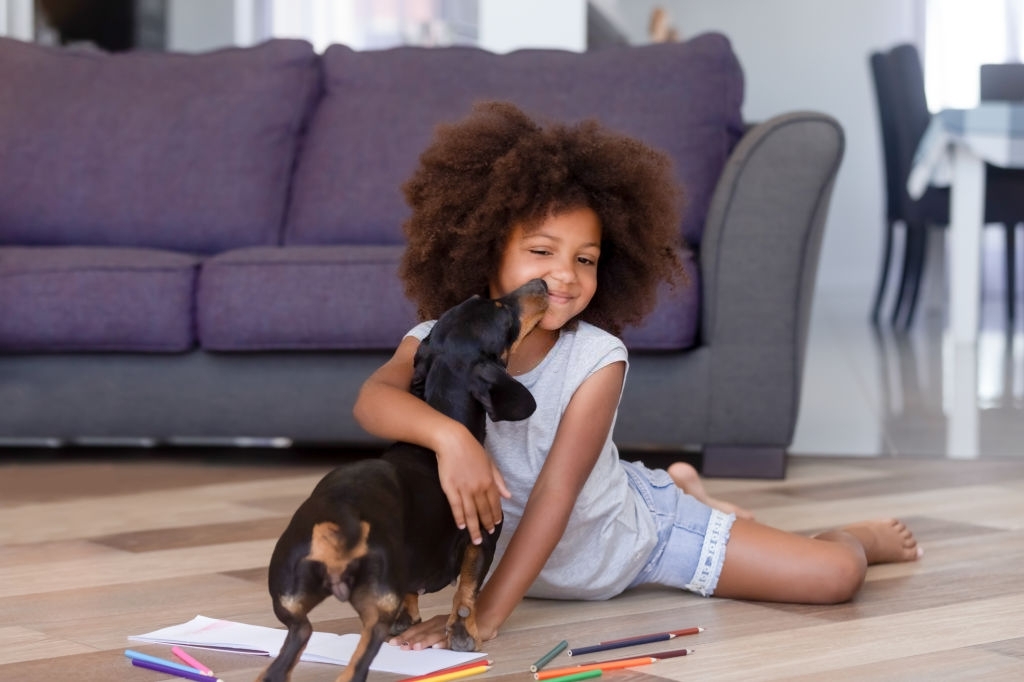Essential cleaning tips for pet owners
Our pets love nothing better than running about outside, chewing and playing with nearly anything that moves, picking up bacteria and other germs as they go. That’s why it’s important to take a few extra steps to help ensure they don’t inadvertently spread these germs in your home. Equally, you want to take measures to ensure the cleaning products you are using in your home are suitable to use around pets.
Can germs be spread from my pet?
Some of the germs that pets carry, such as salmonella and staphylococcus, can be spread to humans through contact with your pet. Practicing good hygiene can still help to protect the whole family by reducing the risk.
Protecting your pet:
- The most important step in protecting your beloved pet is to make sure they stay healthy.
- Pets should be vaccinated regularly. Keep an up-to-date record of their vaccinations at home or with their veterinarian so you know when they are due.
- Cats and dogs should be treated for fleas and ticks regularly, as well as intestinal worms and parasites.
- Check your pet regularly for signs of ill health. If you think something is wrong, seek advice from your vet.
- Do not give pets human medicine or pain killers. Seek veterinary advice.
Do not use antiseptic cream designed for humans on pet’s wounds (as they will often lick/ingest creams). Speak to your vet if a pet’s wound needs treatment.
Top tips for a healthy home with pets
Protect your family by following these simple hygiene practices, and you, your family, and your pets can live safely and healthily together.
Healthy hands
- Wash your hands after petting or playing with pets, their toys, leads or leashes, cages, blankets, bedding, etc.
- Wash your hands before preparing or serving food.
- Encourage children to wash their hands before eating, especially if they have been in contact with pets.
Trim Claws
- Keep claws trimmed to reduce the risk of scratches – dogs and cats paws and nails can pick up dirt and inadvertently transfer it to you or your children.
Feeding Tips
- Give your pets their own feeding bowl and pet-food serving utensils, which are stored and cleaned separately from other household dishes.
- If possible, position your pet’s feeding station away from the kitchen to reduce the risk of spreading germs.
- Regularly clean and disinfect your pet’s feeding bowl and utensils with pet-friendly products. Rinse items thoroughly with clean hot water and dry before re-use.
- Use products suitable for pets to clean and disinfect the floor area where your pets eat their food. Quite often, they can spill water, saliva, or food particles that can quickly become contaminated with bacteria – especially on a warm day.
- Remember, pets have sensitive noses and paws, so avoid highly fragranced products that can cause irritation.
- Although it can be tempting, avoid letting your pet share your plate or lick your face, as germs can be transferred.
Pets on kitchen surfaces
- It’s important not to allow pets to climb on surfaces where food is prepared or served, as they can spread germs from their paws or fur. The inquisitive nature of casts means they just can’t resist exploring all the nooks and crannies of your home. Even “off-limit” areas like kitchen counters are sometimes frequented when no one is looking.
- To be safe, make sure you spray or wipe countertops and food areas with an antibacterial product before preparing and serving food.
Healthy floors
- Entryways/floors frequented by pets coming in from outdoors and litterbox areas should be given special attention.
- Muddy paws can track in bacteria and other germs. Keep a spare towel at the door to wipe your dog’s feet if you can.
- Clean and disinfect floors regularly in busy pet entryways and near litter boxes.
- Station litter boxes away from where inquisitive toddlers can reach them.
Clean Bedding
- When buying pet beds, look for those with removable covers and wash pet bedding regularly.
- Use Dettol Antiseptic Liquid to help remove germs and allergens while removing fur, odours, and bacteria.
- Use low-fragranced detergents and skip the highly scented fabric softeners or dryer sheets – your pet’s nose can be quite sensitive to fragrance.
- If your pets sleep on you or your kids’ beds, make sure you wash and sanitise bed linens regularly.
Safe Cleaning Tips
- Never use bleach when a pet soils your carpet or floors. The ammonia in the urine will react with the bleach and give off harmful fumes.
- Avoid using any ammonia-based products, as the ammonia smell may encourage your pet to “mark” the area.
- Avoid harsh chemicals when cleaning areas that pets frequent, and/or rinse well with warm water.
- When cleaning floors, try to prevent pets from walking across them until they are dry, since pets groom their paws and fur with their tongues.
- If your puppy is prone to drinking from the toilet, avoid in-the-bowl toilet cleaners, or keep the lid closed.
- Keep cleaning products safely stored in cupboards with caps screwed on tightly to avoid accidental ingestion.
- Avoid cleaning pet cages and fish tanks in your kitchen sink. Clean them outside if you can, using a bucket of fresh soapy water, or a pet-friendly detergent.
For more information on how you can keep your home clean – apart from keeping your pets’ activities hygienic – click here.
